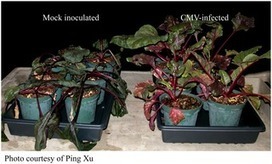See on Scoop.it – Virology News
Viruses have generally been studied either as disease-causing infectious agents that have a negative impact on the host (most eukaryote-infecting viruses), or as tools for molecular biology (especially bacteria-infecting viruses, or phage). Virus ecology looks at the more complex issues of virus-host-environment interactions. For plant viruses this includes studies of plant virus biodiversity, including viruses sampled directly from plants and from a variety of other environments; how plant viruses impact species invasion; interactions between plants, viruses and insects; the large number of persistent viruses in plants that may have epigenetic effects; and viruses that provide a clear benefit to their plant hosts (mutualists). Plants in a non-agricultural setting interact with many other living entities such as animals, insects, and other plants, as well as their physical environment. Wild plants are almost always colonized by a number of microbes, including fungi, bacteria and viruses. Viruses may impact any of these interactions [1].
Nice, reasoned review on something most human and animal virologists take no notice of whatsoever…B-) OK, she does have "Plant Virus Biodiveristy" as her first heading, but hey, I misspelled my own name on my second paper when referring to my first!
The bottom line is that we notice plant viruses when they do things to our crop plants or companion plants – and not when they are in their natural (read: non-agricultural / horticultural) setting. As Marilyn points out, plant viruses may interact with plant host, insect vector and humans – and with other pathogens and commensals and symbionts, making for a potentially VERY complex ecosystem.
Interestingly, "wild" plant viruses often cause persistent infections, and are efficiently transmitted vertically – and may even, as in the begomovirus-infected Abutilon, give rise to a pleasing phenotype that has resulted in spread, via cultivation, around the world.
The world needs more plant virologists. It certainly has enough plant viruses!
See on www.plospathogens.org

3 June, 2013 at 02:41 |
The demonstration by Hewitt et al. (1958) that certain nematodes are vectors of plant viruses initiated research in Nematology and Virology that resulted in understanding of the transmission and etiology of an important group of soil-borne plant virus diseases.
4 June, 2013 at 13:52 |
[…] Virus ecology looks at the more complex issues of virus-host-environment interactions. For plant viruses this includes studies of plant virus biodiversity, including viruses sampled directly from plants and from a variety of other … […]
17 June, 2013 at 05:33 |
There are no plant viruses known that recognize specific receptors on the plant. Rather, plant viruses tend to enter plant cells either through a surface injury to a leaf or the woody stem or branch structures, or during the feeding of an insect or the microscopic worms known as nematodes. These methods of transmission allow the virus to overcome the barrier imposed by the plant cell wall and cuticle layer. Those viruses that are transmitted by insects or animals must be capable of multiplication in the hosts as well as in the plant.